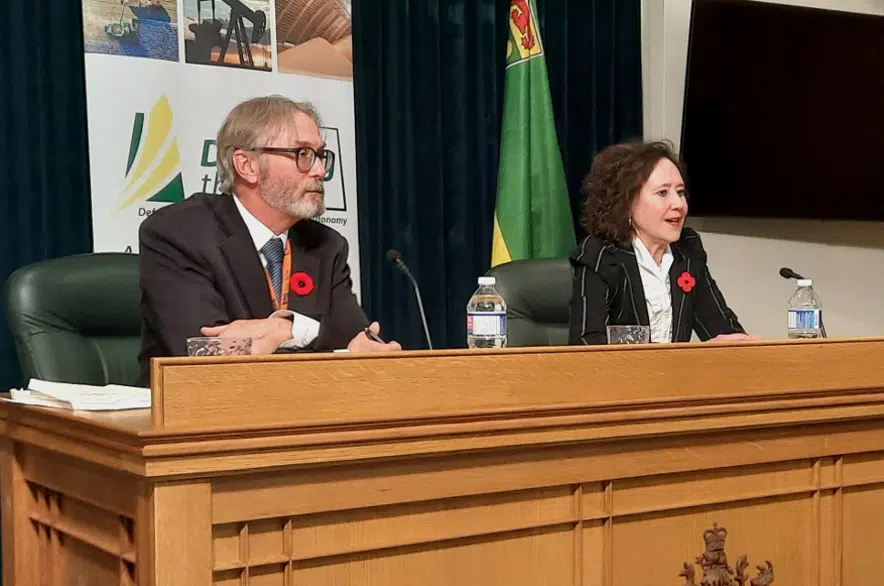The first piece of legislation the provincial government introduced this sitting was The Saskatchewan First Act, which was introduced Tuesday afternoon.
It amends the province’s constitution to assert Saskatchewan’s “exclusive” jurisdiction when it comes to legislation around the exploration for, development, conservation and management of non-renewable natural resources in Saskatchewan, the development, conservation and management of forestry resources in Saskatchewan, and the operation of facilities in Saskatchewan that generate electricity.
The changes also assert Saskatchewan’s jurisdiction around the regulation of businesses within those confines, the regulation of fertilizer use in Saskatchewan, and “any other prescribed matter.”
The bill introduced Tuesday also creates an Economic Impact Assessment Tribunal that will look at federal initiatives and quantify, with a dollar amount, their impact within Saskatchewan.
“This bill will create the framework to define, address and quantify economic harm because that harm is real and is being perpetrated on just one region. We’re tired of the double standards and, frankly, of the contempt for ordinary working people and their livelihoods,” Saskatchewan Justice Minister Bronwyn Eyre said before the bill was introduced.
Eyre didn’t answer directly whether the tribunal will take the impacts of climate change into its assessments, just that the province’s work on that front is ongoing.
Eyre said the amendment isn’t symbolic. The changes and the reports that come out of the tribunal could help if and when Saskatchewan takes the federal government to court over such regulations it feels oversteps jurisdictions.
“The amendment of Section 45 sends a signal also to the courts that we take this seriously enough to signal exclusive jurisdiction being part of that which is in the constitution of Saskatchewan,” explained Eyre.
Outlining the plan for the bill in the throne speech, the government said it wanted to assert its autonomy against what it called the federal government’s “end run around Saskatchewan’s constitutional jurisdiction over natural resources under the guise of environmental regulation.”
Mitch McAdam, the director of Saskatchewan’s Constitutional Law Branch in government, said there’s nothing in the amendments to say the province can disregard federal laws.
“What the law does is it recognizes that that’s the role of the courts and the courts are the ultimate arbiters of where that dividing line is between federal and provincial jurisdiction,” said McAdam.
The federal government could challenge the changes and Eyre said she’s not sure what federal government will do.
“We feel that this is legally sound, certainly constitutionally sound. We feel that establishing economic parameters around harm will help us define and quantify what we are looking at in terms of asserting exclusive jurisdiction,” said Eyre.
Eyre pointed to things like the carbon tax (which she says is causing economic harm in the province right now), the clean electricity regulations that appear to be on the way from the federal government, and rules around methane emissions (which Eyre said the provincial and federal governments had a deal on but then the goalposts changed).
Eyre said the provincial government just wants an honourable partnership with the federal government.
“This isn’t about fed-bashing for kicks. This is about quantifying, assessing and defining economic harm. It’s about our place in this federation and our responsibility to the people of Saskatchewan to foster economic growth,” she said.
The minister hopes these changes won’t foster an “us versus them” mentality, but she admitted that sometimes it feels like they’re already there.
The tribunal will have a chair and vice-chair and the ability to call in experts depending on the area it’s examining at that moment. Eyre said it will be intensive in terms of parsing the dollar figures associated with the federal policies and the idea is for it to be independent, transparent and accountable.
Eyre couldn’t say how much the tribunal will cost.
NDP to consult
The NDP didn’t have anything too specific to say about The Saskatchewan First Act on Tuesday, as Justice Critic Nicole Sarauer explained she’d just got a look at the bill after it was introduced.
She did have some initial thoughts, though, on whether it would benefit Saskatchewan.
“I’m not sure there’s any value in just copy-pasting what already exists in the Constitution,” said Sarauer. “If it makes the government feel better, fine. I don’t think it has a whole lot of legal significance.”
She said if the government wanted to do something for Saskatchewan now and get what the province deserves out of the federal government, then it could revive the lawsuit over equalization.
Sarauer said the NDP is going to talk to experts in the field about the legislation as well as business leaders and other people in Saskatchewan to get their thoughts.
Looking at the tribunal that would be created, Sarauer said the NDP wants to know how much it will cost.
“We want to make sure that basically us, as Saskatchewan residents, are getting value for our dollar,” said Sarauer.











